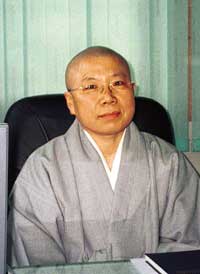
Priestess Tak Yeon is the daughter of Priestess Byeok Hae (aged 73), who manages the Naewon Cell at Donghwa Temple, a well-known training ground for Bhikkunis. In the footsteps of her mother, who became a Buddhist nun after becoming widowed during the war, Priestess Tak Yeon first shaved her head when she was six years old. She formally entered priesthood in 1969 under the guidance of Priest Hyeon Oh in the Gukil Cells of Haein Temple. She entered Jungang Buddhist University in 1983, and went on to study in Japan in 1986.
"The reason I went to Japan was not to achieve a degree. We were living in an increasingly globalized era, and what I had learned as an undergraduate wouldn't have been enough when meeting foreigners, especially Japanese. The scriptures were well translated into Japanese and easy to understand, and so I thought I would need to learn the Japanese language to be a good Buddhist scholar. So I went to Japan basically to study Japanese."
The simple dream of studying Japanese kept her in Japan for 10 years, in which she eventually earned a Doctorate, telling herself that she would be done with studying once and for all. Studying on a full scholarship at Risho University, Priestess Tak Yeon's thesis dealt with the psychological world of Buddhist scriptures, the psychological depth of humanity.
Upon returning to Korea, she taught for eight years at the Bongnyeong Temple Buddhist University in Suwon. She hopes to keep teaching even after finishing her term as the Director of Culture.
Currently, there are about 20 Bhikkunis like Priestess Tak Yeon who have majored in Buddhist Studies. Why is it that Bhikkunis are so scarce in the Buddhist administration as well as in Buddhist history despite the fact that there are just as many Bhikkunis as Bhikkus? "To answer that question, you have to determine when the history of Buddhism started for women. The first-ever Bhikkuni was Priestess Mahapajapati, Buddha's aunt. 500 women left home with her, and that was the very first Bhikkuni organization. The first Bhikkuni in Korea lived in the Shilla era. Her name was Sassi. It wasn't even a proper name, since 'sa' means 'history' and 'ssi' 'surname.' Anyway she was the first Korean Bhikkuni."
The first person to enter priesthood after Buddhism came into Korea was a woman. Priestess Tak Yeon is interested in discovering the great Bhikkunis buried in the long history of Korean Buddhism and recording them in the annals of Buddhism.
"In the times that Buddha lived in, women were held in contempt. The precepts he laid down back then were compatible with his times, and today, it's a matter of which way you interpret his teachings. If you interpret the Eight Principles as a denial of gender equality, than Bhikkunis will continue to face conservativeness and discrimination. But precepts should be interpreted against the backdrop of the times, even if they are written in stone. What was right in the past may not be right today, because times have changed. So it would be unreasonable to apply the precepts in exactly the same way they were applied in the past."
Religion cannot be an exception in these times of gender equality, and so Priestess Tak Yeon says that she will heed the "call of the times" She explains, "I think that Bhikkunis are leading fulfilling lives these days participating in a variety of social activities, but I will continue to advance their rights within the bounds of Buddha's laws and through consultation with the President of the Korean Bhikkuni society."
"Since I was appointed by the Bhikkunis of Korea to represent them in the Administration, finishing my term of office successfully and doing a good job will pave the way for more Bhikkunis to assume important posts in the Administration, right?" Priestess Tak Yeon promised that despite the heavy responsibility and difficulties that lie ahead, she would do her best not to smear the reputation of Bhikkunis.

